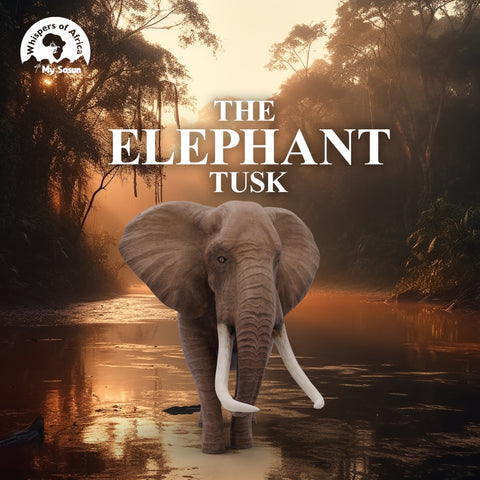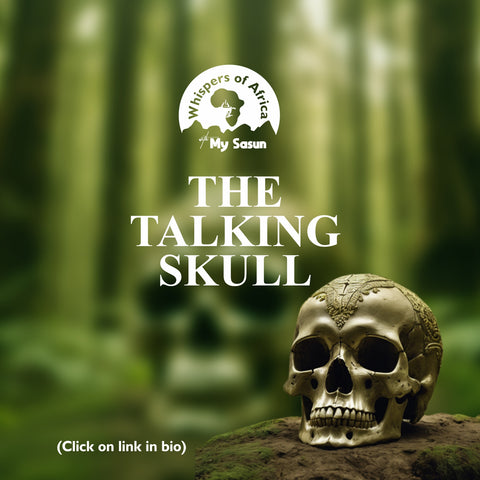Once, in the heart of Oje, there lived a wise and noble elephant named Kibo. Kibo was renowned for his massive tusks, which were the largest and most beautiful in all the land. They glistened in the sunlight, a testament to his age and wisdom. The other animals of the savannah held Kibo in high regard, and he served as a protector and advisor to them all.
One hot, dry summer, a drought struck Oje. The rivers dried up, the grass withered, and the animals began to suffer. Kibo, with his immense wisdom, called a meeting of all the animals beneath the shade of a giant baobab tree.
"My friends," Kibo trumpeted, "We are facing a great crisis. The drought threatens us all, and we must find a solution to quench our thirst and nourish our bodies."
The animals murmured in agreement but were uncertain how to proceed. The wise old elephant continued, "I believe I have the answer. My tusks can dig deep into the ground and find water where others cannot. I shall use my tusks to unearth the hidden springs and bring water to our parched land."
The animals were overjoyed by Kibo's proposal and thanked him for his selflessness. Kibo, with his strong and sturdy tusks, began to dig wells across the savannah, unearthing cool, refreshing water that saved the animals from thirst.
As the days turned into weeks, Kibo's tusks bore the burden of the hard labor. They grew worn and chipped from their constant use, and Kibo himself became tired and weak. Yet, he pressed on, knowing that his efforts were saving the lives of his fellow creatures.
However, as the drought persisted, the other animals began to grow impatient. They whispered amongst themselves, "Why should Kibo be the only one to save us? Why should he bear this burden alone?"
A group of envious young elephants, led by a bull named Tembo, approached Kibo. Tembo was jealous of Kibo's fame and beautiful tusks. He said, "Kibo, your tusks are magnificent, but they have made you arrogant and prideful. We can help you dig the wells and share in the glory."
Kibo, ever wise, understood the younger elephant's motivations but agreed to their proposal. As a team, they dug even more wells, and the waters flowed freely, quenching the thirst of all the animals.
But the envious elephants couldn't contain their greed. One day, when Kibo was exhausted and resting under the shade of a tree, they conspired to steal his beautiful tusks. They believed that if they possessed his tusks, they would gain Kibo's wisdom and revered status.
Under the moonlit night, Tembo and his conspirators approached Kibo and, using their immense strength, wrested his tusks from his head. Kibo awoke with a start, but it was too late. The younger elephants had stolen his most prized possessions.
As they ran off with the tusks, Kibo's heart was heavy with sadness, not for the loss of his magnificent tusks, but for the betrayal of those he had tried to help. The other animals soon discovered what had transpired and felt a deep sense of sorrow for Kibo.
In the wake of the incident, the savannah fell into a deep silence. The absence of Kibo's majestic tusks left a void in the hearts of all who knew him. Even the younger elephants who had stolen his tusks began to feel a growing sense of guilt and regret.
Kibo, without his tusks, felt a profound change in himself. He realized that his wisdom was not bound to his physical appearance or possessions but came from the experiences he had gathered over the years. He chose not to seek revenge against those who had wronged him but instead to focus on the greater good of the savannah.
He spoke to the animals under the baobab tree, "My dear friends, my tusks were taken, but my spirit remains unbroken. I will continue to dig wells for the benefit of all, for that is my purpose."
With renewed determination, Kibo continued to dig wells despite the pain and vulnerability he felt without his tusks. The other animals watched in awe as he persevered, showing them the true meaning of resilience and selflessness.
Meanwhile, the younger elephants who had stolen Kibo's tusks began to face their own dilemmas. They realized that having beautiful tusks did not automatically make them wise or respected. In fact, the other animals grew wary of them and questioned their intentions.
Tembo, the leader of the group, began to feel a heavy burden of guilt. He knew he had betrayed a friend and a mentor. One night, unable to bear the weight of his actions any longer, he returned to Kibo and offered a heartfelt apology.
"Kibo," Tembo said, "I am deeply sorry for what I have done. I was blinded by envy and greed, and I now see the error of my ways. Will you ever forgive me?"
Kibo, who had always been forgiving and understanding, extended his forgiveness to Tembo. He said, "I forgive you, Tembo. We all make mistakes, but what truly matters is that we learn from them and make amends."
This act of forgiveness had a profound impact on Tembo, and he decided to change his ways. He, along with the other younger elephants, pledged to protect and care for Kibo in his time of need. Together, they continued to dig wells, guided by the wisdom that Kibo had shared with them.
As time passed, the savannah began to recover from the drought. The old barren land started to flourish, and the animals thrived once more, thanks to the wells Kibo and his friends had dug.
The story of Kibo's selflessness, resilience, and forgiveness became a powerful parable for all the creatures of the African savannah. It served as a reminder that true wisdom is not measured by physical attributes but by the character of one's heart. Kibo's legacy lived on, not in his tusks but in the lessons he had imparted and the unity he had inspired among the animals of the land.
So, under the sprawling branches of the ancient baobab tree, the tale of Kibo, the wise elephant who lost his tusks but never his spirit, continued to be told for generations to come, a testament to the enduring power of love, forgiveness, and the resilience of the human spirit.
The younger elephants, in their greed, believed that they would now possess Kibo's wisdom and become revered like him. However, without the tusks, they realized that wisdom could not be stolen, and true respect must be earned.
In the end, Kibo remained a wise and noble elephant, despite losing his tusks. The other animals rallied around him, and the younger elephants learned a valuable lesson about the importance of integrity and the consequences of jealousy and betrayal.







Comments (1)
My heart is so filled with joy. If you are suffering from Erectile dysfunction or any other disease you can contact Dr. Moses Buba on this buba.herbalmiraclemedicine@gmail.com or His website : https://www.facebook.com/profile.php?id=61559577240930 . For more information from me reach me via WhatsApp : +44 7375 301397